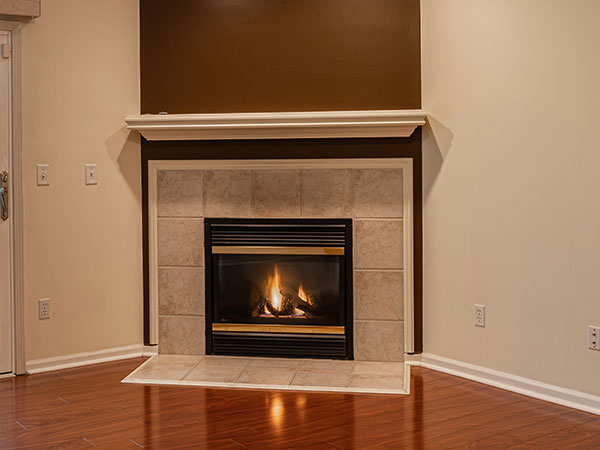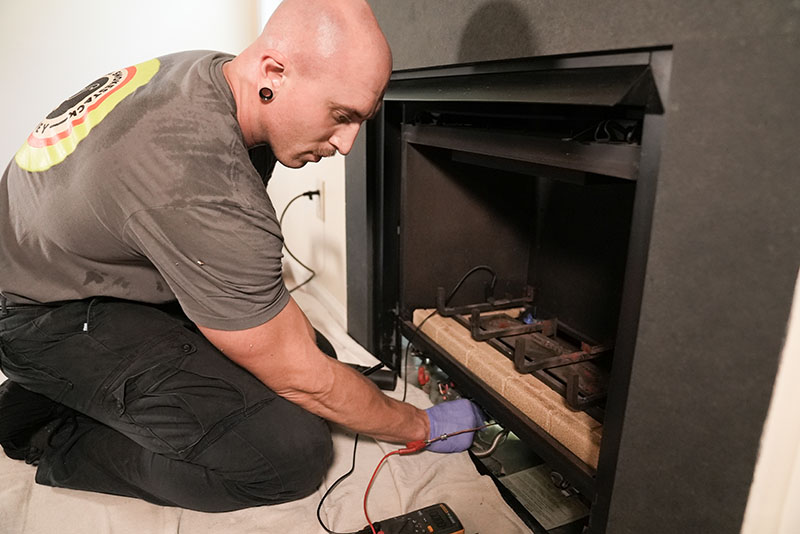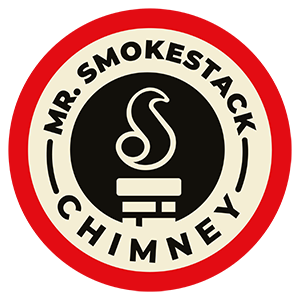Gas Fireplace Service & Repair for Durham, Raleigh, Greensboro & More: We’ll Make Sure Your Setup Is Good to Go
Having a gas fireplace in your home means relaxation and comforting warmth at the touch of a button. But even though these convenient, easy-to-use appliances require less maintenance than wood fireplaces might, they’re not completely maintenance-free. The truth is that all gas appliances need to be serviced. And for gas fireplace servicing near Raleigh, Greensboro, and Durham, we’re the team to hire.
Here at Mr. Smokestack Chimney Service, we follow the National Fire Protection Association’s (NFPA) recommendation and suggest that gas fireplace service be scheduled annually – our priority is to make sure that every gas fireplace in Broadway and Raleigh is maintained properly and safe to use.
When it’s time to schedule your yearly service, we’re the team to trust. Call us at 919-747-1859 or book an appointment online.

What Maintenance Does a Gas Fireplace Need?
Many homeowners assume that a gas fireplace doesn’t need as much attention as a masonry or wood-burning fireplace. While that’s somewhat true, routine maintenance is always an absolute necessity.
Why? It ensures that all of the parts of your fireplace are in peak condition (regardless of the type of fuel you use). Regular gas fireplace services and cleanings can definitely extend its lifespan, and we want you to enjoy your fireplace for as long as possible.
Aside from professional inspections and servicing, you should have a personal cleaning schedule to prevent soot and dirt from clogging parts of the fireplace, all of which can impact how well it functions. Once a month, take a small hand broom or paintbrush and gently sweep away dust and dirt. This will help keep your fireplace functioning well in between professional cleanings.
How Often Do Gas Fireplaces Need to be Serviced?
We recommend booking this maintenance once per year – usually in the spring or summer months.
If you wear eyeglasses, you probably have an annual appointment with your eye doctor to monitor changes in your vision. Small tweaks to your prescription keep your vision from getting worse – or if there is an issue, you can get on top of it quickly.
Home appliances follow a similar thought process, which is why you should have your gas fireplace serviced at least once a year. Even if you don’t suspect any problems and everything looks to be in good shape, there could be functional issues that you can’t see until it’s advanced.
And this isn’t just us offering the recommendation… The NFPA and the Chimney Safety Institute of America (CSIA) both state that all heating appliances be serviced annually – or more depending on how much you use your gas fireplace.

When Else Should You Schedule Service For Your Gas Fireplace?
Because your gas fireplace produces carbon monoxide (a toxic gas) it’s important that you also schedule service whenever you notice any changes or problems with fireplace performance – even if you’ve recently had your annual service. If something’s not working correctly, your risk for carbon monoxide exposure is increased.
Some of the most common problems customers face with gas fireplace appliances include:
- The fireplace won’t light. If you’re having a hard time getting your fireplace to light, it may be due to a problem with the ignition system. We’ll take a close look at the pilot light and gas valve as they’re usually the source of ignition issues.
- The pilot light won’t stay lit. The pilot light is a small blue flame that should stay lit all the time. Downdrafts could cause it to go out. If that’s the case, you can relight it. But if it happens continuously, it could be a sign of bad wiring or that the thermopile needs to be fixed.
- The pilot light works, but it’s weak. You can get the fireplace to start, but the flame isn’t as bright as it should be and it’s not giving off very much heat. Why? It could be as simple as the burner needs to be cleaned. Other times, the gas levels are too low to support the flame. One of our technicians can easily correct those problems for you.
- Soot is built up on the logs and on the glass of the fireplace. Soot isn’t uncommon at all, especially if you use your fireplace regularly. It can usually be curbed if you’re keeping up with a cleaning routine. Every now and then, there’s too much soot and that’s usually an indication that there’s a systemic problem, like a blocked burner or bad ventilation.
- It’s making strange sounds. Your gas fireplace shouldn’t make much noise, and a change in noises and frequency is a warning that something is wrong. A malfunctioning blower, for example, can cause high-pitched whining or grinding sounds.
- There’s an odd smell. Foul odors aren’t normal for a gas fireplace. A sudden change in smell could be due to a dirty chimney or flue. If you smell rotten eggs or burning gas, though, that’s indicative of a leak. Turn off the fireplace, open the windows, leave your home, and call appropriate authorities.
- The fireplace isn’t responding. Should the fireplace stop responding to the thermostat, remote control, or wall switch, try changing the batteries. If this happens with an electrically-controlled thermostat, the problem could be caused by bad wiring.
- The carbon monoxide detector is going off. For your safety, there should be a carbon monoxide detector located near your fireplace. Gas fireplaces can leak carbon monoxide – and that is an emergency. It’s a clear and scentless gas that is potentially lethal. If the alarm is sounding, don’t ignore it or assume it’s the batteries. Leave the area and call in emergency services.
If you experience any of the above frustrations or any other problems or issues with your gas fireplace, don’t wait for your annual service appointment. Give Mr. Smokestack Chimney Service a call or reach out to us online. We offer all kinds of gas service and repairs for hearth appliances, and our technicians can get to the bottom of things fast.
Worried about costs? We work hard to make our prices fair and affordable, without compromising our level of service or the quality of our work or parts. Some items can be fixed with a simple service. If additional replacements or repairs are needed, we’ll be happy to go over your options and find a solution that works within your budget.
What Does a Yearly Gas Fireplace Service Look Like?
During a yearly service, the technician will clean all areas of the gas fireplace system and then run a gamut of diagnostic tests on the fireplace. These tests are designed to alert us to any safety concerns or usability issues, so that when we’re done, you’ll know just what your fireplace needs (if anything).
Here at Mr. Smokestack Chimney Service, we offer gas log service, cleaning, and diagnostic tests for an affordable price. Schedule yours today by giving us a call or booking online now.
Do Gas Fireplaces Need to Be Vented?
Gas fireplaces, like their wood-burning counterparts, require an exhaust flue or vent to eliminate harmful toxins from your home. When possible, a gas fireplace can be vented through an existing chimney system. Other times, vents are installed through the ceiling or a nearby wall. And sometimes, when homes don’t have a fireplace structure to repurpose and the costs to install adequate ventilation just aren’t in the budget, the ventless gas fireplace enters the game.
Looking to know more about your options – both vented and ventless?
- Direct vent. This is the most common type of venting for gas fireplaces. Direct vent fireplaces have a sealed combustion system that draws air from outside the home and expels exhaust gases outside as well. They can be vented through a wall or roof.
- Natural vent (B-Vent). Natural vent fireplaces use indoor air for combustion and rely on hot gases to expel exhaust through a vertical vent or chimney. These are less common in modern homes due to their lower efficiency and potential for drawing air from the living space.
- Ventless. Ventless gas fireplaces do not require external venting and are designed to burn gas more completely. However, they release some combustion byproducts into the room, including water vapor and small amounts of carbon monoxide. These are often used in spaces where installing a vent would be difficult, but should only be an option in rooms with enough size and proper air circulation.
And if you have any questions, absolutely don’t hesitate to reach out. We’re happy to – and more than capable of – leading you through this process.
How Can You Tell If You Have A Gas Leak In Your Home?
Although gas is naturally odorless, you’ll typically notice an odor if you have a gas leak in your home. The reason is that many gas companies add Mercaptan to the gas, which contains sulfur. This is done so that it can be detected when a leak occurs.
Unfortunately, this doesn’t ring true for carbon monoxide. Because it is produced due to incomplete burning (and doesn’t come from the gas company), its odorless, colorless nature will remain undetectable.

How Much Does It Cost to Maintain a Gas Fireplace?
Gas fireplaces are an appealing choice for homeowners because they’re easy to use and they’re very efficient. Because of this reputation, many assume that they’re more expensive than wood-burning fireplaces. So, is that accurate? Well… it depends.
The costs of maintaining a gas fireplace can vary depending on a few things. Here are some of the common questions that influence upkeep costs:
- What kind of fuel do you burn? Whether you use propane or natural gas can impact your budget. If your home is already connected to a natural gas supply, using natural gas for your fireplace is cost-efficient. You won’t need to worry about refilling tanks, and the supply is continuous. Propane is stored in tanks so it’s suitable for use in areas where there isn’t access to a natural gas line.
- Do you have a venting system? Ventless gas fireplaces don’t have chimneys that need to be cleaned, so they don’t need as much maintenance as a vented or direct vent fireplaces.
- Have you kept up with annual maintenance? We stress the importance of annual services for your gas fireplace because these are critical to identify and repair problems when they’re in their beginning stages. Unchecked problems will further compromise your fireplace and jeopardize its structural integrity – and more intensive repair work will hurt your bottom line.
Is It Cheaper to Repair or Replace a Gas Fireplace?
We don’t like to find problems when servicing your gas fireplace, but sometimes we uncover unpleasant things that leave homeowners with a difficult decision: repair or replace? That ultimately depends on the extent of the damage we find and what’s more prudent for your budget.
Consider repairing your gas fireplace if…
- The issues are minor. A repair is probably a more cost-effective solution for a gas fireplace with a small issue or component malfunction. Common minor issues include problems with the pilot light, thermocouple, or ignition system.
- The fireplace is new or installed recently. If your gas fireplace is relatively new and still within its expected lifespan, repairing it could be a reasonable – and financially logical – choice. It’s easier to find replacement parts for newer fireplaces, which should help you save money.
- The ultimate cost of repairs are hefty. When a chimney technician from Mr. Smokestack Chimney Service diagnoses a problem with your gas fireplace, we’ll give you some different options to consider. We believe an informed client is a happy client – it’s easier to make a decision with more information. Compare the cost of the necessary repairs to the cost of a replacement fireplace. If the repairs are significantly cheaper and can restore the fireplace to safe and efficient operation, repairing might make the most sense.
Consider replacing your gas fireplace if…
- There is substantial damage. If your gas fireplace has significant damage like a cracked firebox, severe ventilation issues, or extensive wear and tear, replacing it might be the better choice. Major repairs could become costly and may not provide a viable long-term solution.
- It’s an older model. Older gas fireplaces can lack modern safety features and energy efficiency, so upgrading to a newer model could be a great investment. You should also think about your long-term plans for your home – if you’re planning to put it on the market in the future, a new gas fireplace is a great selling point.
Can I Convert My Wood-Burning Fireplace to a Gas Fireplace?
Yes, it’s definitely possible to convert a wood-burning fireplace to a gas fireplace.
This conversion is a common choice for homeowners who want to enjoy the convenience and efficiency of a gas fireplace, but have an existing fireplace and chimney structure to use. Depending on the type of gas fireplace you’ve chosen and the amount of space you have to work with, you can choose between gas logs, a gas insert, or a built-in gas fireplace.
What Is the Lifespan of a Gas Fireplace?
On average, a gas fireplace that has been maintained properly can last anywhere from 15 to 25 years. This can change based on if it was installed correctly, if you’ve taken care of repairs in a timely manner, and if you’ve kept up with yearly servicing. Repairing or replacing parts that malfunction or become damaged can keep your gas fireplace working longer.
Call Today For Reliable Gas Fireplace Service & Peace Of Mind
Don’t make the mistake of believing your gas fireplace doesn’t need a little love once in a while. Call Mr. Smokestack Chimney Service for annual gas fireplace service and repair. Our team is among the best in the business and we’ve been taking care of gas fireplaces for Broadway and Raleigh residents for close to 20 years.
Call us now at 919-747-1859 or reach out to us online. A member of our customer service team is here and ready to help get you started.
You should definitely give our chimney and vent experts a call as soon as you discover you have a leaky chimney problem. Don’t wait for it to get any worse…call now.
